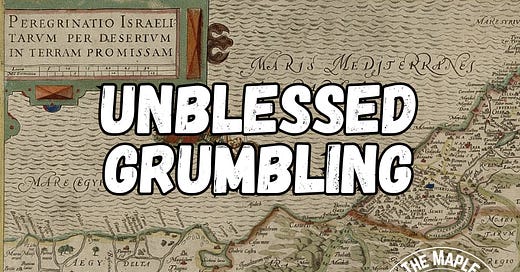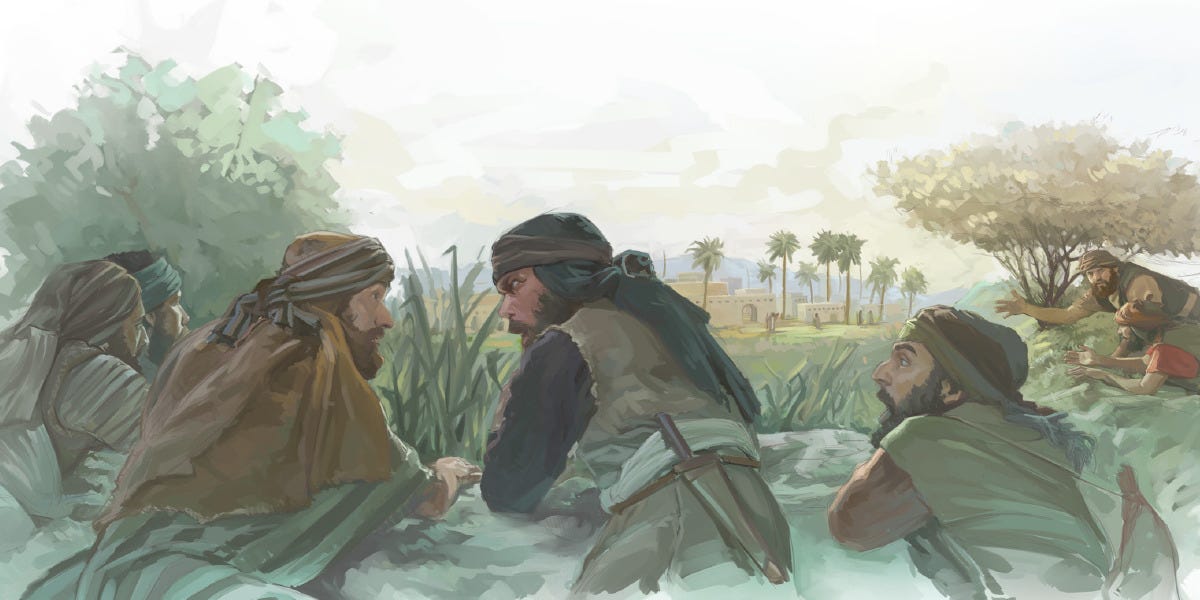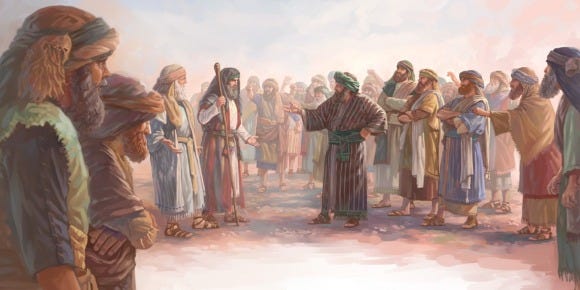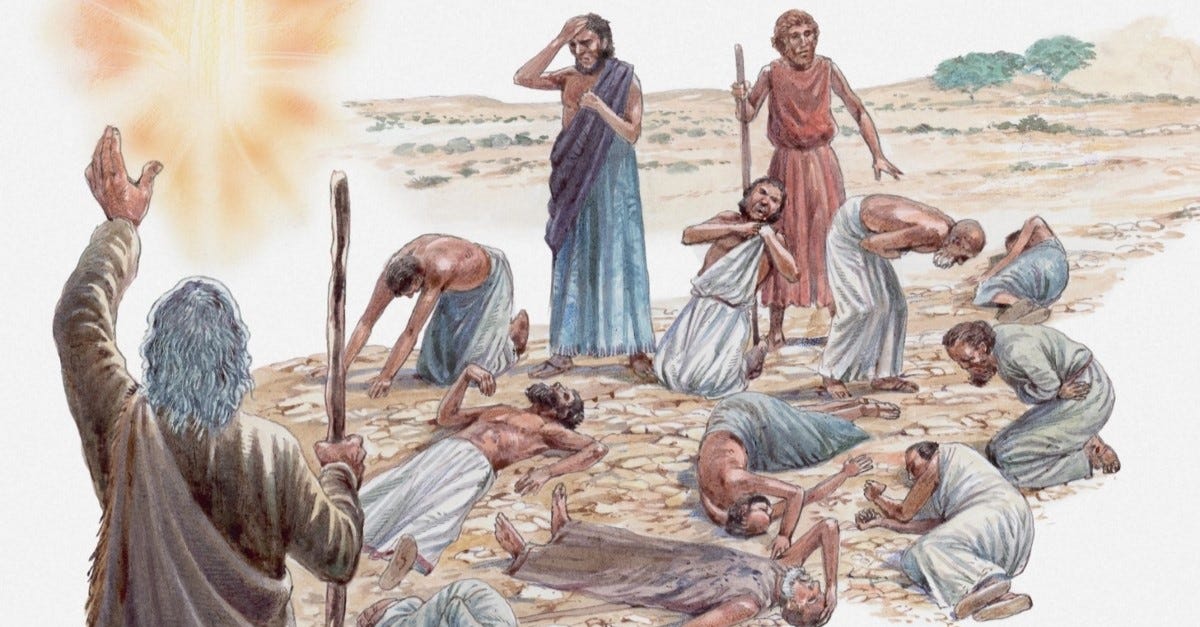Report and response
In Numbers 13, twelve Israelite spies are sent into Canaan to survey the land, its inhabitants, and the enemies they will be battling when they enter the land to conquer it. Once the spies return, they give their report to the rest of Israel, and especially to Moses. “And they told him, ‘We came to the land to which you sent us. It flows with milk and honey, and this is its fruit. However, the people who dwell in the land are strong, and the cities are fortified and very large. And besides, we saw the descendants of Anak there’” (Numbers 13:27-28).
Caleb tried to edify the people, encouraging them to be faithful and believe that the Lord would give them the victory. However, the spies are unflinching. “Then the men who had gone up with him said, ‘We are not able to go up against the people, for they are stronger than we are.’ So, they brought to the people of Israel a bad report of the land that they had spied out, saying, ‘The land, through which we have gone to spy it out, is a land that devours its inhabitants, and all the people that we saw in it are of great height. And there we saw the Nephilim (the sons of Anak, who come from the Nephilim), and we seemed to ourselves like grasshoppers, and so we seemed to them’” (Numbers 13:31-33).
Even though the Lord freed them from slavery in Egypt and granted them victory at the Red Sea, the Israelites are utterly deflated by this report, and they engage in what has been for them a regular pattern of behaviour – complaining. “And all the people of Israel grumbled against Moses and Aaron. The whole congregation said to them, ‘Would that we had died in the land of Egypt! Or would that we had died in this wilderness! Why is the Lord bringing us into this land, to fall by the sword? Our wives and our little ones will become a prey. Would it not be better for us to go back to Egypt?’ And they said to one another, ‘Let us choose a leader and go back to Egypt’” (Numbers 14:2-4).
Moses pleads with the people to stop complaining and to trust the Lord who has delivered them. “If the Lord delights in us, he will bring us into this land and give it to us, a land that flows with milk and honey. Only do not rebel against the Lord. And do not fear the people of the land, for they are bread for us. Their protection is removed from them, and the Lord is with us; do not fear them” (Numbers 14:8-9). In response to this exhortation from Moses, the Israelites gather stones to kill him, to which the Lord responds by displaying His glory to save Moses (Numbers 14:10).
A wrathful response
In spite of everything the Lord has done for His people, they rebel, complain, and attempt to murder the chosen vessel through which Yahweh has brought about Deliverance – Moses. They have been supremely ungrateful and sinful, which is why the Lord tells Moses that He will destroy all of the Israelites (Numbers 14:11-12). Moses intercedes for the people, invoking the glory of God as His justification, and the Lord withholds His wrath (Numbers 14:13-19).
However, the Lord promises that there will be very real and very severe consequences for their sinfulness. “Truly, as I live, and as all the earth shall be filled with the glory of the Lord, none of the men who have seen my glory and my signs that I did in Egypt and in the wilderness, and yet have put me to the test these ten times and have not obeyed my voice, shall see the land that I swore to give to their fathers. And none of those who despised me shall see it” (Numbers 14:21-23). On top of that, the ten spies that brought a bad report were killed by a plague that came from the Lord (Numbers 14:37-38).
To make matters worse, the people possess and display a false grief and sorrow, presuming they will attain the land the Lord has promised anyway. Moses warns them to not further invoke the wrath of God. However, in their stubbornness and sinfulness, they decide to rebel against God yet again, and they experience significant losses in battle as a result. “But they presumed to go up to the heights of the hill country, although neither the ark of the covenant of the Lord nor Moses departed out of the camp. Then the Amalekites and the Canaanites who lived in that hill country came down and defeated them and pursued them, even to Hormah” (Numbers 14:44-45).
A rotten, rebellious heart
The Lord responded in great wrath and anger to the sins of the Israelites in this narrative. Why such a strong response from the Lord? What great sin or sins did they commit? Interesting enough, they did not engage in outright idolatry and false worship, as they did with the Golden Calf incident (Exodus 32). They didn’t engage in vile sexual sin. They didn’t commit murder. They didn’t offer their babies to Molech. They didn’t defile the Sabbath. What did they do?
They were afraid, and their fear led to doubt, and their doubt led to worry, and their worry led to complaining. Those were the sins – fear, doubt, worry, and complaining – that not only brought about the instant death of the ten spies, not only defeat in battle, but also the promise (and fulfillment) that every single adult twenty years and older among the Israelites would die before they entered, or even saw, the Promised Land. Graphic as it may seem, there was a literal trail of dead bodies strewn across the desert from Egypt to Canaan, made up almost exclusively of Israelites.
Their great rebellion was being more afraid of the Canaanites than the Holy one of Israel who Himself retains the power to both give and take life. Their great rebellion was doubting the power, presence, and promises of the Lord, who up until that moment had shown Himself to be abundant in all three. Their great rebellion was worrying about their future livelihoods, forgetting that the Lord has provided deliverance, food, and protection. Their great rebellion was complaining about Yahweh and His chosen servant Moses, preferring instead the chains and beatings of Egypt to freedom.
Despite our feelings and first responses, these are very serious sins. We usually don’t put them high on the list of serious sins – not when compared to things such as murder, adultery, rape, blasphemy, and idolatry – but these are grievous sins, so evil in fact that God killed an entire generation of an ethnic group over them. It behooves us to examine these sins more closely, in order to take them more seriously.
An attack on God
All of these sins, though distinct, share the same evil core that manifests itself differently. What is that core? The lie that God is either not powerful enough, not capable enough, or not good enough to do what He has said He will do, and that if we were in God’s place, we would do a much better job of being God than Him. These sins are a direct affront to the nature and character of God; they come against His very person.
When you allow fear – of anything or anyone – to grip your heart and mind, you believe that this thing or person is stronger than God, or that it is more dangerous than God is powerful. Fear says that God is NOT present and active in the lives of His people, caring for and providing for them. We are saying that we do NOT believe God when He promises, “Fear not, for I am with you; be not dismayed, for I am your God; I will strengthen you, I will help you, I will uphold you with my righteous right hand” (Isaiah 41:10).
This fear leads to doubt, and when we doubt the promises of God, we doubt that God has the power and ability to do what He has said He will do, and we doubt that God is truly sovereign over the universe, directing all things according to His providence. We are basically calling God a liar. God makes many promises in the Scriptures, and He asserts that by His might and sovereign decree He will bring them to pass. When we doubt, we are telling God, “No, you can’t.” The Word of God says, “Behold, the Lord's hand is not shortened, that it cannot save, or his ear dull, that it cannot hear” (Isaiah 59:1). Doubt says, “I don’t believe that.”
This doubt leads to worry, which goes beyond the fear of the present and translates into a fear of the future. Worry asks questions like, “What if I don’t have a job after the tariffs take full effect? What if I won’t have enough to survive once our economy nosedives? What if I never find someone to marry and I end up alone? What if my children don’t grow up and profess faith in Christ?” Whereas doubt disbelieves God for today, worry disbelieves God for tomorrow and beyond. Worry assumes that God lacks both the power and ability to care for us in the days ahead, but more than that, worry diminishes the Lord and puts Him, not as the Ruler of time as One existing outside of it, but as a fellow passenger on our journey, equally as helpless for whatever dangers we encounter. The Scriptures testify that, “God will supply every need of yours according to his riches in glory in Christ Jesus” (Philippians 4:19). Worry says, “I'm not too sure about that.”
Doubt leads to the final destination of this sinful journey, which is complaining and grumbling. I want to make sure you understand that these sins are not just randomly listed; they occur in succession, from one to another and so forth, from less grievous to more grievous. Fear, doubt, and worry exist, primarily, within our hearts and minds. They are things we think and feel, and they are usually kept to ourselves. But once those internal conditions make their way out of our mouths and they manifest externally, then we have given full breath to complaining or grumbling.
Obviously, the first three sins are an offense to God and detrimental to us. However, when we complain, we externalize these sins, often to the listening ears of others, and our grumbling affects them as well. Complaining can negatively affect the faith and hope in others. When we complain, it can generate fear in others, as well as doubt and worry, which means our sins have now spilled into the souls of others, leading them to sin in like manner. This is why it is at the point of complaining that the Lord promised to not only kill the Israelites, but also promise they would never see Canaan with their own eyes. Complaining invites others to join in your rebellion, which only increases the sins against God exponentially.
Be like Joshua and Caleb
For those of us who engage in any self-examination of sinful thoughts and actions, we tend to focus on some of the other sins I have mentioned thus far. We consider who we have lied to, or against whom we have borne false witness. We confess sexual sins and ponder where we have pursued impurity. We think about hateful thoughts we have had toward others. But – and be honest – have you spent significant time asking yourself about how you have given yourself over to the serious sin of fear? Have you grieved for the God-diminishing sin of doubt? Have you repented of your woeful sin or worry? Have you confessed your invitation for others to sin by complaining? We must take these sins – and they are sins – very seriously, because God takes them seriously, and because we love and want to honour our King.
Moreover, to engage in these sins, particularly the external grumbling and complaining, is to ultimately rob oneself of the blessings that the Lord promises those who obey Him in thought, word, and deed. The Israelites were prohibited from seeing and entering the Promised Land. Now, while true followers of Jesus are not barred from our heavenly “Promised Land” for these sins, there are temporal blessings we forgo through our disobedience.
What might they be? For starters, how about the Fruit of the Spirit? These sins will rob you of peace, joy, patience, gentleness, faithfulness, and self-control. In fact, these sins are antithetical to the Fruit of the Spirit. To not live a Spirit-filled life is to experience a fractured relationship with God, which is to bring into one’s life anxiety, depression, and a calloused conscience.
We also miss out on the other blessings that come from obedience, such as seeing God make good on His promises and prove Himself faithful. We could also lose out on evangelistic opportunities that come from trusting God and being able to tell others how God showed Himself to be real and true. We could miss out on seeing the Lord work, which might look like an answered prayer for a myriad of things.
Finally, and most importantly, we flee from these sins because we love our great God and King. Jesus has paid for our sins, given us new life, and promised us the hope of eternity. Out of devotion and affection for Christ we gladly obey Him, or at least we should. I tell my children often, better they obey me, and do so sincerely, knowing who I am and how I feel about them, because it will turn out for their good. The Lord deserves our glad, honest, thankful, and sincere obedience, and we should love Him enough to bring it.
Be less like the grumbling and complaining spies, and be more like the bold and ready-to-obey Joshua and Caleb.







Fear, doubt , worrying , then complaining and grumbling aloud.
We need these removed from us - permanently!
Excellent reminder A.B
Convicting and powerful word, brother.